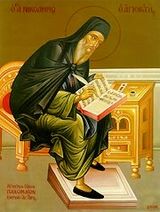Nicodemus of the Holy Mountain
St. Nicodemus was born Nicholas Kallivourtzis c. 1749 in Naxos, Greece. In 1775 he became a monk of Dionysiou on Mount Athos. He worked with Saint Macarius Notaras of Corinth to compile the Philokalia, a defining work on monastic spirituality, as well as original works such as Lives of the Saints. He was, however, influenced significantly by Roman Catholic spirituality, canon law, and theology. He translated and edited The Spiritual Combat (1589) by Lorenzo Scupoli, a Catholic priest of Venice, renaming it Unseen Warfare, and the Spiritual Exercises of Ignatius of Loyola, the founder of the Jesuits. He made use of Roman canon law in The Rudder, and held to the Anselmian view of the Atonment. There is an extant letter by St Nicodemus to Bishop Paisios of Stagai requesting an indulgence, and promising financial payment for it. Roman influence is also found in his manual on sacramental confession, the Exomologetarion.
St. Nicodemus reposed in the Lord in 1809 and was glorified by the Orthodox Church in 1955. He is a local saint of the Metropolis of Paronaxia and the Holy Mountain. His feast day is celebrated on July 14.
Sources
- Nicodemus of the Holy Mountain (Roman Catholic)
- Modern Orthodox Saints (Vol. 3) by Constantine Cavarnos. Published by the Institute for Byzantine & Modern Greek Studies, 1994 (ISBN 0914744410)
See also
External link
Categories > Church History
Categories > Church History
Categories > Church History
Categories > Church History > Canon Law
Categories > Liturgics > Feasts
Categories > Liturgics > Feasts
Categories > Liturgics > Feasts
Categories > People > Monastics
Categories > People > Monastics > Athonite Fathers
Categories > People > Saints
Categories > People > Saints > Greek Saints
Categories > People > Saints > Saints by century > 19th-century saints
Categories > Spirituality > Asceticism
